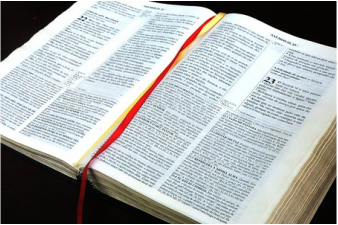|
In today’s lesson, God continues to address Israel with grace despite their sins. Lessons from the text Misplaced Power This chapter brings to light a confusion which permeates society: people attribute the power to perform a task to the tool instead of the one who uses the tool. Consider, does a lawn mower have the power to cut grass? No. It has the potential to cut grass but is useless until a human operates it. The lawn mower cannot of its own free will cut the grass. Who, then, is cutting the grass? A person, of course. It would be absurd for someone to use a lawn mower to cut the grass and then, seeing the cut grass, bow down and worship the lawn mower as the god of grass. Unfortunately, such is precisely what people do. God uses the example of a tree. Because people can use a tree to better their lives through fire, cooking, buildings, etc., people of the past worshipped trees as their provider. The trees, however, were not providing anything! They were used as a tool by a human to perform a task. Now, consider two modern idols: spiritualism and money. Because people use meditation, acupuncture, and herbs for relaxing purposes, they ascribe power to these things. Meditation, instead of being a way to silence yourself, becomes a way to worship the spirits of the world. Because people attribute power in something, they give it a will, and suddenly you have built a false religion. Money, too, has the same problem. Money is a tool to exchange goods. Like a tree or lawn mower, it serves a purpose and is neither good nor evil in any way. It is an object, not a person. But when people see that it can get them things, they begin to elevate it above its proper place and attribute power to it when, in fact, the power still resides in a person to use the money. How many children, once they have grasped the concept of money, get really big eyes when you hand them a twenty hundred dollar bill? Instead of just being a tool, it becomes something to be desired, something with which to empower oneself. Why do people chase after high-dollar jobs and fancy cares? They believe it gives them power. But the power is not in the money. It’s in us. Accumulating tones of money to save you from harm in this life is as ridiculous as bowing down to ask a lawn mower for protection! Consider one last thought: if the power to perform functions resides in us and not in the tools we use, then relying on those tools for deliverance is actually relying on our own power to save ourselves. We would be relying on our ability to buy our way out of trouble, mediate through all sorrows, etc., instead of being able to strengthen ourselves from an outside source. Such is why we must turn to God for salvation and deliverance, for He is an external source who can strengthen and deliver us when our resources have run out.
 1-2 Even though the Jews as a nation have sinned, God promises them grace. When a society falls away from God, if there is a faithful remnant, God may show grace instead of judgment. Additionally, if God sees that in the future one will repent, He will patiently withhold judgment to give one time to repent. This holds true of both nations and individuals. 3-5 Seeing that the children of the present day Jews would repent, God promises blessings and restoration. This is a direct counter prophecy to the end of chapter 43. God will punish the fathers for their sins yet bless the children for their faith. 6 Noteworthy is that both the Father and Jesus speak in this verse. The Father is the King of Israel and Jesus is the Redeemer and Lord of hosts, or captain over the angels. See I Samuel 8:7, Joshua 7:13-15, and Revelation 1:11. Even though two are speaking, they, plus the Holy Spirit, are one God (Deut 6:4). 7 God is saying that He does not need anyone’s help to perform His will, since from the beginning of time He has appointed all things. This is not a verse in opposition to free will; God, seeing what choices people will make, appoints certain things to ensure that His plans are carried out despite man’s rebellion. This verse is also reminiscent of chapter 41 where God challenges the false gods to defend themselves by declaring the future, a task they cannot perform but should be able to if they were gods. 8 Because God’s prophecies have been fulfilled in the past, one can trust that whatever God says about the future will come to pass. 9-11 In the time of trouble, rather than seeking refuge in their gods, those who believe in false gods will be ashamed. One knows whether or not one’s god is real. The idol worshipper knows in the subconscious that his god is a creation and cannot help him. Compare with Romans 1:18-23. 12-20 God provides a clear explanation of how people create false gods.
Additionally, God is mocking the false gods by saying that the very same thing of which they are made is also what it burned and destroyed in a fire—is such a thing a god?  21-22 Having entered into a covenant relationship with God, Israel will not be forgotten by Him. Anyone who has become a child of God has this same promise. Once one has received forgiveness from God, one now is treated as a beloved child. God will beckon one to return, pleading with one. A person who has strayed does not have to be saved again but instead is to return to the Lord. 23 Redemption is a cause for praise, for the one who is saved, for those who are already saved, for the angels, and even for creation itself. See Luke 15:10. 24-28 In an amazing promise of grace, God declares His sovereign power, His superiority over the wicked, His faithfulness to His servants, and a very specific prophecy of Jerusalem’s restoration. All of grace is dependent on God’s sovereignty; because He is able to overpower the wicked, He can deliver one from the prison house of sin. He can destroy the wicked and exalt the believer. Noteworthy is that God, about eighty before Jerusalem would be destroyed by the Babylonians, decrees that it will be rebuilt. God promises good to those who endure judgment on this world caused by the sins of the wicked. If one is faithful to God, He will restore one after judgment is complete. The story of Job is an example. See also Matthew 10:22 and James 1:12. Cyrus was the king of Persia who conquered Babylon and freed the Jews after their seventy years of captivity (II Chro 36:20-23). ___________________ Thank you for your faithfulness in studying God’s word. Please comment below to share what you learned from today's lesson.
0 Comments
Leave a Reply. |
Devotional Categories
All
Archives
September 2023
|
|
Join my mailing list!
|
Thank you!You have successfully joined our subscriber list. |
|
© 2024 Melissa Beaty
|

